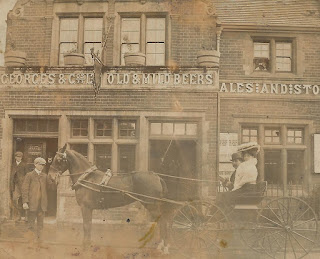Bristol is of particular interest to me, not only because I live near, but also because three quarters of my family were living in the city at the turn of the last century. My research into the social history of that period has proved a real eye-opener because it has allowed me to understand my forebears' lives in terms of what was going on at the time.
 |
| Great-grandfather No1 moved from the countryside and established himself as a haulier |
I now realise that his move coincided with the industrialisation of the North Somerset coalfields at a time when the countryside was severely depressed. The mines attracted many new industries to the southern fringes of Bristol, and glue manufacturing was one of them. I'm pleased to say that in the following years Gg-No1 acquired a horse and established himself as a haulier in the St George district of Bristol.
 |
| Great-grandfather No2 (with pipe) and friends, one of Bristol's many bootmakers |
 |
| Great-grandfather No3 'at the wheel' with his wife outside the Cooper's Arms |
Quite how promising their footballing careers would have been I will never know because the Football league was brought to a halt by the war in 1915, with only regional and friendly matches permitted. The brothers all served in the army and although they survived the war, their names were never mentioned on team sheets again.
 |
| Great-grandfather No4, a Liverpool lad |
All this just goes to show that although family historians have never had so much information at their fingertips, a study of local and social history will help make sense of it all and bring it alive.
And finally...even though I've got two books to work on now, please let me reassure you that I will be continuing this blog as usual using letters and themes from the First World War - and now including a few from Bristol.
'Letters From The Trenches' and 'Bristol In The Great War' are being published by Pen and Sword Books; both are due out next year.
Good luck with your research.
ReplyDeleteLook forward to reading your findings.
Thanks Louise. I've just returned from a day at Bristol Record Office and the Local Studies Library - there's so much of interest to research that it needs a will of iron not to be distracted and to stick to the task in hand!
ReplyDelete